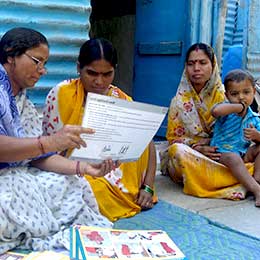FANTA worked to improve the health and nutrition of vulnerable children and mothers in the developing world and helped governments and partners strengthen policies, systems, and programs supporting maternal and child health and nutrition (MCHN). FANTA’s efforts included promoting optimal dietary and feeding practices, focusing on critical time periods when nutritional needs are greatest. This includes the period from conception until a child turns 2 years old—referred to as the first 1,000 days—as well as a focus on children 2–5 years of age and adolescents in countries where early marriage and childbearing are common. In addition, FANTA worked to integrate services that address prevention and treatment of malnutrition within communities.
Our MCHN activities included:
- Providing support to countries at the national and local levels to coordinate and promote the adoption of global MCHN guidance.
- Working with national governments to develop nutrition action plans and national policies that focus on improving nutritional status, especially among the most vulnerable.
- Working with partners to develop and support evidence-based community MCHN programs by conducting formative assessments, strengthening capacity in the implementation of Essential Nutrition Actions and other key MCHN actions, and developing guidance for the design of community-based approaches.
- Undertaking a nutrition policy analysis and advocacy process to create a favorable country-level enabling environment for addressing malnutrition in Uganda, Ghana, Ethiopia, and Haiti with the PROFILES tool, which uses spreadsheet models to estimate the consequences of malnutrition.
- Supporting countries to calculate the cost of MCHN interventions that address nutritional and health priorities.
- Supporting countries to develop nutrition advocacy strategies to promote government investment in nutrition.
- Conducting research, such as: examining the effectiveness of dietary interventions during pregnancy in Malawi; investigating the effectiveness of interventions for sustaining nutritional status among children who have recently recovered from moderate acute malnutrition; studying the effectiveness of lipid-based nutrient supplements in Bangladesh; and Estimating the Effect of Suboptimal Breastfeeding Practices on Child Mortality.
- Working to build the evidence base on the size and nutrient content of food rations in the context of the Preventing Malnutrition among Children under 2 Approach (PM2A).
- Providing guidance to help partners develop comprehensive, evidence-based nutrition programs, including collaborative development of the CORE Nutrition Program Design Assistant.



